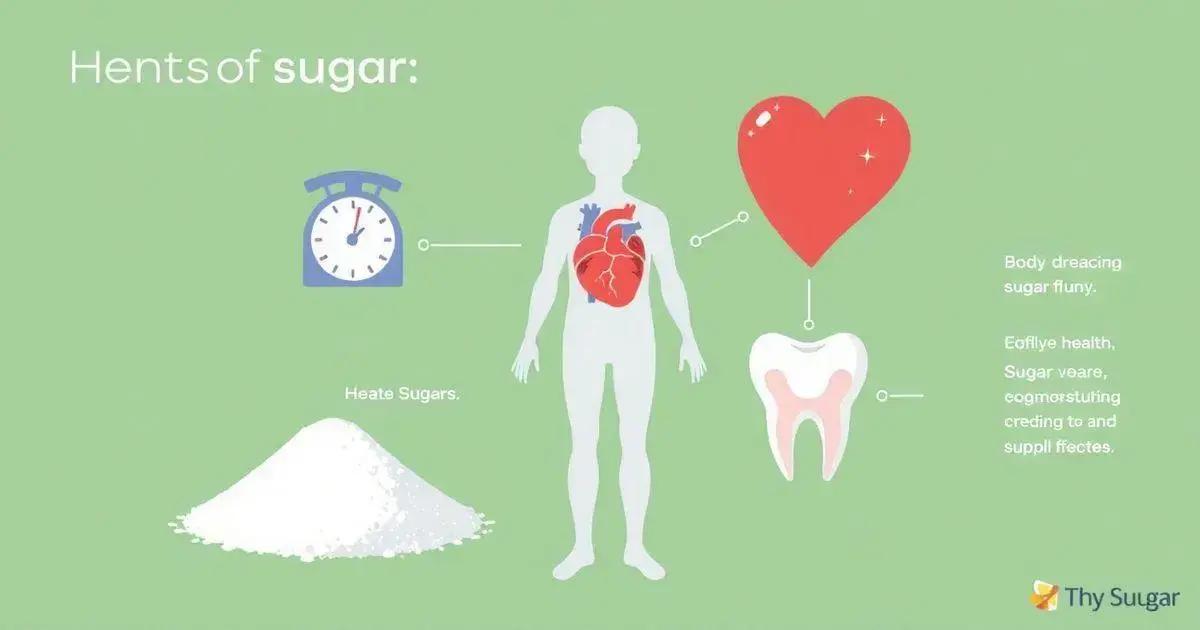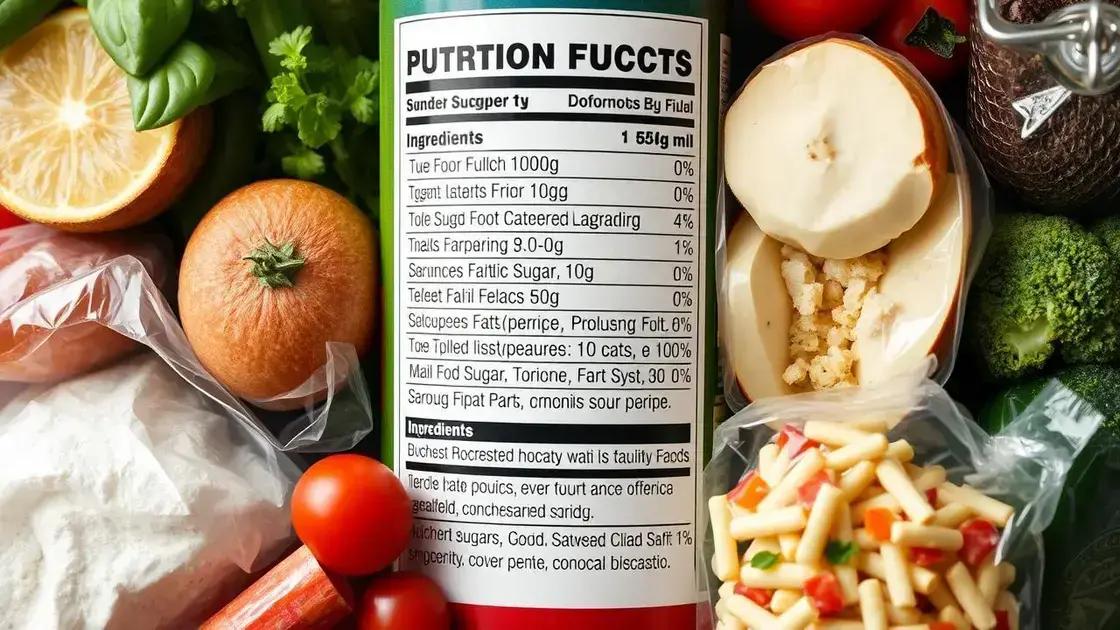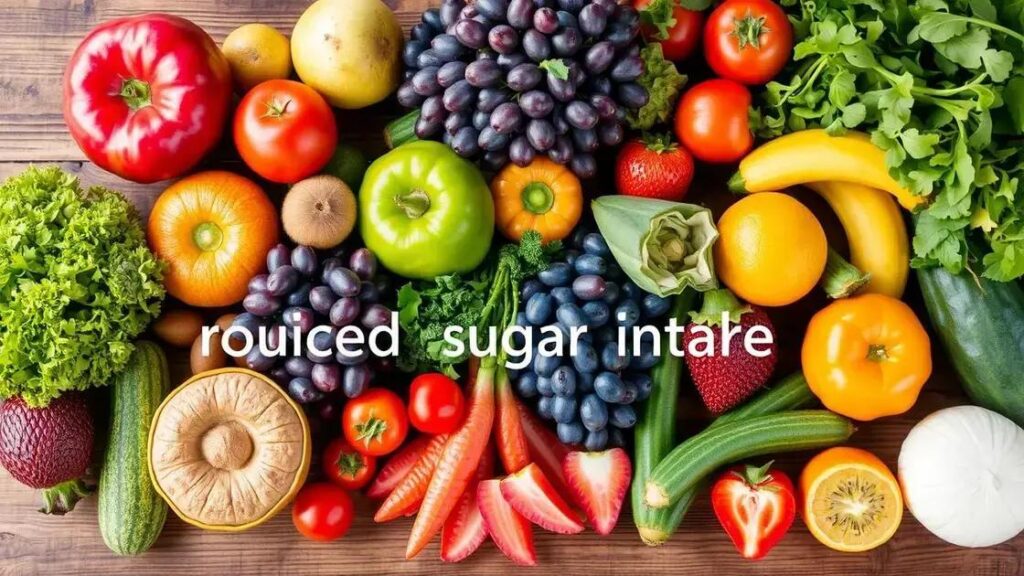Reducing sugar intake is essential for better health as it helps with weight loss, lowers the risk of chronic diseases such as heart disease and diabetes, stabilizes energy levels, improves skin health, and enhances overall well-being by minimizing hidden sugars in processed foods.
How to reduce sugar intake for better health? Reducing sugar is crucial for maintaining good health and preventing chronic diseases. Excessive sugar consumption can lead to numerous health issues, including obesity, diabetes, and heart disease. In this article, we will discuss practical strategies for identifying hidden sugars, tips on cutting back, and the benefits of making healthier choices. You’ll learn how small changes can lead to significant health improvements.
Understanding the Impact of Sugar on Health

Understanding the Impact of Sugar on Health
Sugar plays a significant role in our diet, but its effects on health can be troubling. When we consume sugar, our bodies process it into glucose, which is vital for energy. However, too much sugar can lead to various health issues. For example, excess sugar can contribute to weight gain. This occurs because sugary foods are often high in calories but low in nutrients.
Weight Gain and Obesity
Regularly eating high-sugar foods can lead to weight gain and potentially obesity. Studies show that heavy sugar consumption is linked to an increase in body fat, especially around the abdomen. This fat is not only a cosmetic issue but also a risk factor for diseases.
Type 2 Diabetes
Another serious concern is type 2 diabetes. When we eat sugary foods, our blood sugar spikes, causing the pancreas to produce more insulin. Over time, this can make our bodies less sensitive to insulin, leading to diabetes. Reducing sugar can help maintain stable blood sugar levels and improve insulin sensitivity.
Heart Disease Risks
High sugar intake is also associated with an increased risk of heart disease. Excess sugar can lead to high blood pressure, inflammation, and high triglyceride levels—all of which are risk factors for heart disease. By cutting back on sugar, you can lower these risks and support heart health.
Dental Problems
Moreover, sugar intake significantly affects dental health. Sugar feeds bacteria in the mouth, leading to plaque buildup and cavities. Reducing sugar intake can promote better oral hygiene and prevent tooth decay.
Identifying Hidden Sugars in Your Diet

Identifying Hidden Sugars in Your Diet
Many foods contain hidden sugars that can surprise you. This is especially true for processed foods. Even those that seem healthy can pack a sugary punch. For instance, sauces, dressings, and snacks often include added sugars that go unnoticed.
Read Food Labels
To spot hidden sugars, always check the nutrition label. Look for ingredients like high fructose corn syrup, sucrose, glucose, and fructose. These are all forms of sugar! Remember, sugars can be listed under many different names, so being aware of them can help you avoid excess intake.
Beware of ‘Healthy’ Options
Many products marketed as “healthy” can still contain hidden sugars. Items like granola bars, yogurt, and smoothies often have sugar added to improve flavor. Always be cautious and read labels carefully even on items that claim to be healthy.
Watch Out for Sugary Drinks
Beverages are another significant source of hidden sugars. Soft drinks, fruit juices, and energy drinks may seem refreshing, but they are often filled with sugar. Instead of sugary drinks, try water, herbal teas, or naturally flavored water.
Understand the Ingredients
Familiarize yourself with different types of sugars listed in ingredients. Look for words ending in “-ose” and any syrup names, as they usually indicate added sugars. Additionally, fruit juices concentrate could also contribute to sugar levels, even if they seem natural. Understanding these terms helps reduce unwanted sugar intake.
Practical Tips to Cut Back on Sugar

Practical Tips to Cut Back on Sugar
Reducing sugar in your diet can be easier than you think. By making small changes, you can cut back on your sugar intake without feeling deprived. Here are some practical tips to help you on your journey.
1. Choose Whole Foods
Focus on eating whole foods like fruits, vegetables, lean proteins, and whole grains. These foods are naturally low in sugar and high in nutrients. They help keep you satisfied and reduce cravings for sugary snacks.
2. Gradually Reduce Sugar
Instead of cutting sugar out completely, try to reduce it gradually. Start by lowering the sugar in your coffee or tea by half. Slowly decrease the amount of sugar in recipes until you reach a level that works for you.
3. Find Sugar Alternatives
Explore natural sweeteners like stevia or monk fruit as alternatives to sugar. These sweeteners can provide a sweet taste without the calories and sugar content. Use them in baking or in drinks to satisfy your sweet tooth.
4. Prepare Your Own Meals
By preparing your meals at home, you can control the ingredients. This helps you avoid hidden sugars found in takeout or packaged foods. Cook simple meals using fresh ingredients to keep your sugar intake low.
5. Read Labels Carefully
When shopping, always read nutrition labels. Look for items with low sugar content. Many foods have added sugars that can sneak into your diet. Aim for foods with little to no added sugar for a healthier choice.
6. Stay Hydrated
Sometimes our bodies confuse thirst with hunger. Drink plenty of water throughout the day to help reduce cravings for sugary snacks and drinks. Staying hydrated keeps you feeling full and energized.
Benefits of Reducing Sugar Intake

Benefits of Reducing Sugar Intake
Cutting back on sugar can lead to numerous health benefits that improve your overall well-being. By making the effort to reduce sugar, you can enhance your quality of life in different ways.
1. Weight Loss and Management
One of the most significant benefits is weight loss. Reducing sugar helps to lower calorie intake. This can lead to fat loss and a healthier weight in the long run. When you choose healthier foods over sugary snacks, you can feel fuller and more satisfied.
2. Better Heart Health
Lowering sugar intake can improve your heart health. High sugar levels are linked to increased blood pressure and inflammation. By cutting sugar, you decrease your risk of heart disease and improve cardiovascular health.
3. More Stable Energy Levels
Reducing sugar helps prevent blood sugar spikes and crashes. This means you will experience more stable energy throughout the day. Instead of feeling tired after consuming sugary snacks, you will feel more balanced and focused.
4. Clearer Skin
Many people notice clearer skin after reducing sugar. Excess sugar can lead to breakouts and acne due to inflammation. When you cut back on sugar, your skin may become healthier and more radiant.
5. Reduced Risk of Type 2 Diabetes
Lowering sugar intake also lowers your risk of developing type 2 diabetes. Cutting back helps your body become more sensitive to insulin. This can keep your blood sugar levels in check and protect you from diabetes-related complications.
6. Improved Dental Health
Finally, reducing sugar intake can lead to better dental health. Sugar feeds bacteria in your mouth, which can cause cavities. By limiting sugar, you support better oral hygiene and maintain a healthier smile.
In summary, embracing a low-sugar lifestyle offers numerous health benefits
By understanding the impact of sugar on your health, identifying hidden sugars in your diet, and following practical tips to cut back, you can significantly improve your overall well-being.
Reducing sugar intake can lead to weight loss, better heart health, stable energy levels, clearer skin, reduced risk of type 2 diabetes, and improved dental health. These benefits showcase why making the effort to lower sugar consumption is essential.
By taking small, manageable steps toward reducing your sugar intake, you can pave the way to a healthier, happier life.
FAQ – Frequently Asked Questions about Reducing Sugar Intake
Why is it important to reduce sugar intake?
Reducing sugar intake is crucial for better health, as it can lower the risk of chronic diseases, assist in weight management, and improve overall well-being.
What are some common hidden sources of sugar?
Common hidden sources of sugar include processed foods, sauces, dressings, yogurt, granola bars, and sugary beverages like sodas and fruit juices.
How quickly can I see benefits from cutting back on sugar?
Many people notice improvements in energy levels, mood, and skin clarity within a few weeks of reducing sugar intake.
Can I still enjoy sweet flavors while reducing sugar?
Yes, you can use natural sweeteners like stevia or monk fruit, and enjoy fruits that offer natural sweetness without the added sugars.
What are some practical tips for cutting back on sugar?
Practical tips include reading food labels, gradually reducing sugar in recipes, choosing whole foods, and cooking meals at home.
Is it necessary to eliminate sugar completely?
No, it’s not necessary to eliminate sugar completely, but it is important to make mindful choices and limit added sugars for better health.













